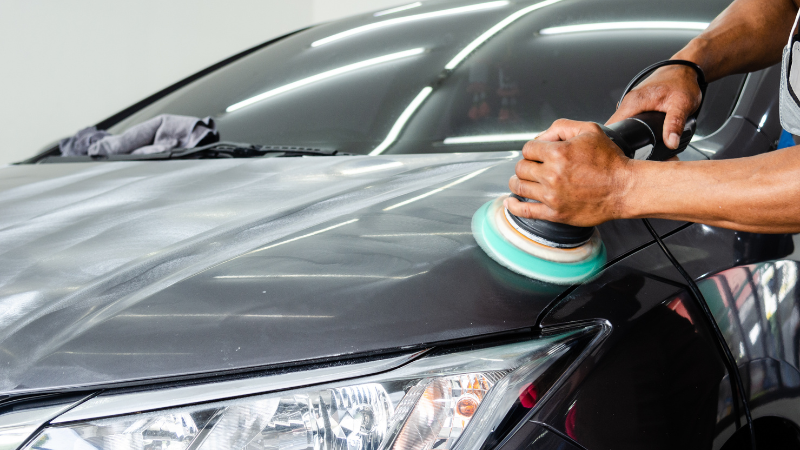Notifications

11 minutes, 46 seconds
-326 Views 0 Comments 0 Likes 0 Reviews

These days, your car is more than just a way to get from point A to point B—it’s a reflection of your personality and a serious investment. But with constant exposure to harsh weather, road debris, UV rays, and daily wear and tear, your vehicle’s paint is always under threat. That’s where ceramic coating for cars comes in. Far from being just a trend, ceramic coating has become a trusted solution for both car enthusiasts and everyday drivers who want long-lasting protection. Whether you’re driving a new luxury car or keeping your daily ride in top shape, ceramic coating offers next-level benefits that go beyond what traditional waxes or sealants can provide.
In this guide, we’ll explore why ceramic coating is the smartest investment you can make for long-term paint protection, how it compares to other options like paint protection film and car wraps, and what to expect when it comes to ceramic coating cost.
Ceramic coating is a liquid polymer applied to a car's exterior surfaces. Once cured, it forms a chemical bond with the paint, creating a semi-permanent layer of protection. Unlike traditional waxes that wear off after a few weeks or months, ceramic coatings can last for years with proper care.
The science behind ceramic coatings lies in their nano-ceramic technology. This formula creates a hydrophobic (water-repelling), UV-resistant, and scratch-resistant barrier that significantly reduces surface damage.
There are two primary types of ceramic coating:
Professional-grade ceramic coatings, applied by trained technicians, offer the longest durability.
Ceramic spray coatings, often used for DIY applications, are more affordable and easier to apply but usually last a shorter period.
One of the leading causes of fading and dull paint is exposure to ultraviolet rays. Over time, UV damage leads to oxidation, causing the paint to lose its vibrancy. Ceramic coating acts as a UV filter, blocking harmful rays and preserving the original factory paint color and finish.
Ceramic coatings are highly hydrophobic, meaning water, dirt, and grime bead up and roll off the surface. This self-cleaning effect helps keep your car looking clean longer and makes washing it much easier.
Your car is exposed to bird droppings, tree sap, acidic rain, road salt, and bug splatter—all of which can etch into unprotected paint. Ceramic coatings create a chemically resistant surface, reducing the likelihood of staining and corrosion.
While ceramic coating won't make your car bulletproof, it does offer resistance to light scratches and swirl marks. The hardened layer can take minor abrasions better than unprotected paint, keeping your surface smoother and glossier.
Ceramic coatings enhance your car’s gloss and depth, giving it that coveted “wet look.” Whether you drive a black, red, or metallic silver car, ceramic coatings bring out the best in the paintwork.
Waxes have long been the go-to for car protection, but they have limitations in durability and performance. On average, wax lasts 4–6 weeks, while synthetic sealants might give you up to 6 months of coverage. In contrast, ceramic coatings can last anywhere from 2 to 7 years depending on the product and maintenance.
Here’s a quick comparison:
|
Feature |
Wax |
Sealant |
Ceramic Coating |
|
Durability |
1–2 months |
4–6 months |
2–7 years |
|
UV Protection |
Low |
Medium |
High |
|
Scratch Resistance |
Low |
Low–Medium |
Medium |
|
Hydrophobic |
Low |
Medium |
High |
|
Gloss |
Good |
Good |
Excellent |
|
Cost |
Low |
Moderate |
Higher, but long-term value |
Another popular option in vehicle paint protection is Paint Protection Film for cars —a clear, durable film applied directly to the surface.
So, what’s the difference between ceramic coating and paint protection film?
|
Feature |
Ceramic Coating |
PPF |
|
Protection Type |
Chemical, UV, hydrophobic |
Physical (impact, rock chips) |
|
Scratch Resistance |
Moderate |
High |
|
UV Resistance |
Excellent |
Moderate |
|
Self-Healing |
No |
Yes (some PPFs) |
|
Gloss Enhancement |
Yes |
Slight |
|
Cost |
Moderate–High |
High |
For maximum protection, many vehicle owners combine both: applying PPF to high-impact areas (like bumpers and hoods) and ceramic coating over the full body, including the film, for shine and chemical resistance. This combo truly offers lifetime protection for any vehicle.
Car wraps are vinyl coverings applied to a vehicle’s body panels to change its appearance, protect the original paint, or promote a business. While wraps are great for visual transformations, they don’t offer the same chemical or UV protection as ceramic coatings. However, wraps can also be ceramic-coated to extend their lifespan and improve ease of maintenance.
Ceramic coating over wraps:
Protects the vinyl from fading and cracking
Enhances color vibrancy
Makes the surface easier to clean
So, if you're considering a car wrap, pairing it with a ceramic coating is a smart way to protect both the wrap and the car underneath.
Let’s address one of the most common questions: how much does a ceramic coating cost?
The answer depends on several factors, including:
The size and type of vehicle
The condition of the paint (prep work required)
The type and brand of coating used
Professional vs. DIY application
Small cars/Sedans: $800 – $1,500
SUVs/Trucks: $1,200 – $2,000+
Luxury/Exotic vehicles: $2,000 – $3,500+
$30 – $100 per bottle (lasts 6–12 months)
While ceramic coating may seem costly upfront, its long-term protection and reduced need for frequent detailing or waxing make it a cost-effective option over time.
Absolutely. Here's why:
Saves Time and Effort: With less frequent washes and easier maintenance, you'll spend less time cleaning your vehicle.
Preserves Resale Value: A car with well-maintained paint holds better resale or trade-in value.
Protects Against Costly Damage: UV fading, chemical etching, and water spots are costly to repair—but easy to prevent with ceramic coating.
Enhances Aesthetic Appeal: Your car stays shinier, cleaner, and newer-looking for years.
The process of applying a ceramic coating isn’t as simple as slapping on some liquid and walking away. Professional application involves:
Thorough Wash and Decontamination: Removing all dirt, grime, and residue.
Paint Correction (if needed): Polishing to remove swirl marks or light scratches.
Application: The coating is carefully applied panel by panel.
Curing Time: Letting the coating bond and harden, usually 12–24 hours.
The entire process can take 1–3 days depending on the vehicle and level of detailing involved.
To maximize the life of your ceramic coating, follow these maintenance tips:
Use pH-neutral car wash soap
Avoid automatic brushes
Apply ceramic boosters or top coats every few months
Avoid washing for at least a week after application
Though ceramic coatings reduce the need for frequent washes, they don’t eliminate maintenance entirely. Regular care ensures your coating performs as intended.
Ceramic coating is ideal for:
New car owners wanting to protect their factory paint
Car enthusiasts who value aesthetics and easy maintenance
Daily drivers looking for a practical, long-term solution
Fleet and luxury vehicle owners needing a professional appearance
If you love your car and plan to keep it for more than a couple of years, ceramic coating for cars is a smart, value-packed decision.
When it comes to preserving your car’s shine and defending its paint from the elements, few options come close to the benefits of a ceramic coating. Whether you're weighing the pros and cons against car wraps or comparing it to paint protection film, one thing is clear—ceramic coating offers unmatched durability, aesthetic enhancement, and convenience.
From budget-friendly ceramic spray coatings to professional-grade installations, there's a solution for every driver and vehicle type. And while the ceramic coating cost may seem steep at first glance, its long-lasting protection, reduced maintenance needs, and value retention make it a wise investment—especially for those seeking lifetime protection for any vehicle.
So if you’re asking yourself whether it’s time to protect your car’s paint once and for all, the answer is simple: yes. Because ceramic coating isn’t just smart—it’s essential.
Car Wraps ceramic coating for cars ceramic spray coating ceramic coating cost how much does a ceramic coating cost Ceramic Coating and Paint Protection Film Lifetime Protection for Any Vehicle

